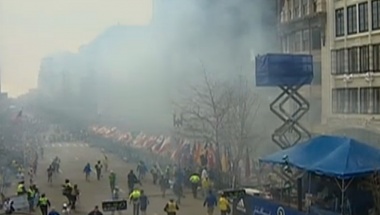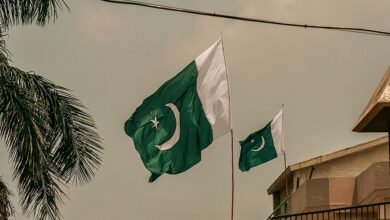
A 19-year-old suspected of carrying out the Boston Marathon bombings with his older brother was captured by police after a day-long manhunt on Friday that closed down the city and turned a working-class suburb into a virtual military zone.
The capture sent waves of relief and jubilation through Boston and the suburb of Watertown, where armored vehicles roamed the streets and helicopters flew overhead through the day. Residents and police officers cheered and clapped when the suspect, Dzhokhar Tsarnaev, was taken alive after a gunfight.
Bleeding and in serious condition, he was admitted to a Boston hospital, a Massachusetts State Police spokesman said.
A spokeswoman for Beth Israel Deaconess Medical Center in Boston, Kelly Lawman, confirmed on Saturday that Tsarnaev was being treated there, but declined comment on his condition. The FBI would be providing any updates, she said.
It was not yet clear when he would face initial charges.
Tsarnaev had been hiding in the stern of a boat parked in the backyard of a house in Watertown, police said. A resident called police after spotting blood on the boat.
President Barack Obama told reporters at the White House after the suspect's capture that questions remained from the bombings, including whether the two suspects received any help.
Monday's bombing, described by Obama as an act of terrorism, was the worst such attack on US soil since September 11 2001, and rattled nerves across the United States.
The brothers, ethnic Chechens who once lived in Russia, are suspected of setting off bombs made in pressure cookers and packed with ball bearings and nails at the crowded finish line of Boston Marathon, killing three people and injuring 176.
The family of Martin Richard, an 8-year-old boy killed in the blast, welcomed the arrest.
"Tonight, our community is once again safe from these two men," the family said in a statement.
The older brother, Tamerlan Tsarnaev, 26, was killed on Thursday night in a shootout with police less than a mile from where Friday night's capture took place.
After combing through a mass of pictures and video from the site in the minutes before the bombing, the FBI had publicized pictures of the two men on Thursday and asked the public for help in identifying them.
Just hours later, events began to unfold fast with the fatal shooting of a police officer on the campus of the Massachusetts Institute of Technology and finally the Watertown firefight, during which police say the brothers threw bombs at officers. Tamerlan suffered fatal wounds, while Dzhokhar escaped on foot.
The brothers had not been under surveillance as possible militants, US government officials said. But the FBI said in a statement on Friday that in 2011 it interviewed Tamerlan at the request of a foreign government, which it did not identify.
"The request stated that it was based on information that he was a follower of radical Islam and a strong believer, and that he had changed drastically since 2010 as he prepared to leave the United States for travel to the country's region to join unspecified underground groups," the FBI statement said.
The matter was closed because interviews with Tamerlan and family members "did not find any terrorism activity, domestic or foreign".
The FBI statement was the first evidence that the family had come to security officials' attention after they emigrated to the United States about a decade ago. It might raise questions about whether authorities missed potential warning signs.
At the same time that police were pursuing Dzhokhar on Friday night, police in New Bedford, Massachusetts, 60 miles south of Boston said three other people had been taken into custody for questioning about Monday's bombings. They were later released, police said.
Authorities said the investigation into the bombings was still open.
They were asked at a news conference on Friday night why authorities did not immediately read the suspect a warning usually given by police to criminal suspects in custody before they are interrogated so statements can be admissible in court.
Massachusetts US Attorney Carmen Ortiz said there was "a public safety exception" that was applied to Tsarnaev regarding the warning known as Miranda rights.
The hunt for Tsarnaev emptied Boston's streets as the city went into lockdown for most of Friday. Public transportation was suspended and air space restricted. Famous universities, including Harvard and MIT, closed after police told residents to remain at home.
The hunt focused on Watertown, where police officers went door-to-door and searched houses. Two Black Hawk helicopters circled the area. SWAT teams moved through in formation.
Massachusetts Governor Deval Patrick lifted the "stay-in-place" order for Boston late on Friday afternoon.
Police were alerted to Tsarnaev's whereabouts by a Watertown resident who went outside after the order was lifted.
He saw blood on a boat in the backyard, Boston Police Commissioner Ed Davis said. He then lifted up the tarp covering the boat and "saw a man covered with blood", Davis said.
Police moved in. "There was an exchange of gunfire, and I don't know if he was struck," Davis said of the suspect.
Authorities, using a bullhorn, had called on the suspect to surrender but he refused to give himself up.
"We used a robot to pull the tarp off the boat," David Procopio of the Massachusetts State Police said. "We were also watching him with a thermal imaging camera in our helicopter. He was weakened by blood loss – injured last night most likely."
Tsarnaev was taken into custody after authorities rushed the boat, Davis said.
‘Put a shame on our family’
Some details emerged on Friday about the brothers, including their origins in the predominantly Muslim regions of Russia's Caucasus, which have experienced two decades of violence since the break-up of the Soviet Union.
The younger brother described himself on a social network as from a minority in a region that includes Chechnya, Dagestan and Ingushetia.
A man who told reporters he was an uncle of the brothers said they came to the United States in the early 2000s and settled in the Cambridge, Massachusetts, area.
Ruslan Tsarni, who lives in suburban Washington and has not spoken to the brothers since 2009, said the bombings "put a shame on our family. It put a shame on the entire Chechen ethnicity."
In separate interviews, the parents of the Tsarnaev brothers said they believed their sons were incapable of carrying out the bombings. Others remembered the brothers as friendly and respectful youths who never stood out or caused alarm.
"Somebody clearly framed them. I don't know who exactly framed them, but they did. They framed them. And they were so cowardly that they shot the boy dead," father Anzor Tsarnaev said in an interview with Reuters in Dagestan's provincial capital, Makhachkala, clasping his head in despair.
The FBI said the two blasts at the marathon were caused by bombs in pressure cookers and carried in backpacks that were left near the finish line as thousands of spectators gathered.
The mother, Zubeidat Tsaraeva, speaking in English, told CNN, "It's impossible, impossible, for both of them to do such things, so I am really, really, really telling that this is a setup."
The Russian-installed leader of Chechnya criticized police in Boston for killing an ethnic Chechen and blamed the violence on his upbringing in the United States.
The Islamic Society of Boston Cultural Center, the biggest mosque in the area, said in a statement that it was shutting its doors until further notice.
The bombings prompted contact between the United States and Russia on terrorism and the Kremlin said on Saturday that the presidents of both had agreed by telephone to increase cooperation on counter-terrorism.




